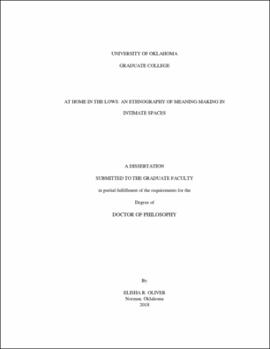| dc.description.abstract | There has been long-standing interest in the ways in which spaces are used by various
cultures and communities. Through an ethnographic study of women, space, and narrative, this
dissertation explores the ways in which spaces of cultural and historical significance are used in
1) the maintenance of biopsychosocial health in a rural marginalized neighborhood; 2) the
telling of “stories” that detail the ways in which these historical and culturally defined spaces
reinforce and maintain social networks; and 3) explain how women living in The Lows make
meaning of their everyday lived experiences that occur in rural Northwest Oklahoma.
The primary questions driving this research are first, what is the cultural significance of
spaces within this community? Second, in what ways do these spaces affect the
biopsychosocial health of women in the neighborhood? Third, how, and why do constructed,
intimate spaces facilitate the telling and sharing of narratives? Fourth, in what ways are the
telling of “stories” significant to the building and maintenance of community cohesion? Lastly,
in what ways do the women living in The Lows make meaning of everyday lived experiences in
a rural and aging community?
By purposefully positioning the voices of the research participant and researcher —the
stories and cultural frameworks attached to this community, along with the critical examination
of the ways in which space is utilized as an emancipatory and empowering tool, my research,
using thick description, provides an intimate ethnographic explanation of space that is both
fixed and transitional. In addition, my research highlights the daily lived experiences of women
living in a marginalized and dying neighborhood. This endeavor is a tripartite ethnographic
construction of intimacy, experimentation, and auto-ethnography. The findings presented
herein indicate that intimate space coupled with “story-telling” promote and strengthen social
bonds, and are, critical elements in community cohesion, self-empowerment, and emancipatory
practices regarding biopsychosocial health, in this rural and aging community.
Keywords: The Lows, Narrative, Curanderismo, Othermothers, Biopshychosocial Health,
Women, Mealtime | en_US |
